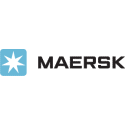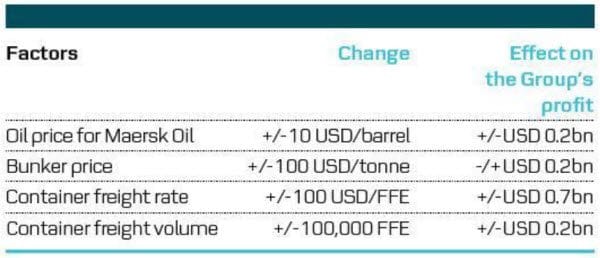“Although most of our businesses deliver good results and the Group’s net result is on a par with last year, we are not satisfied with the Group’s operational performance for the first quarter. Earnings in shipping were weak due to the continued loss-making rates in the container and tanker markets. However, our efforts to increase container rates are paying off and we will continue our initiatives to improve rates throughout the year. We will also maintain a high level of costs for oil exploration and development of discoveries for production. We are confident that these investments will enable us to stop the decline in our oil production and then return to growth towards our target of 400,000 barrels per day,” says Group CEO Nils S. Andersen.
The Group delivered a profit of USD 1.2bn (USD 1.2bn) and a return on invested capital (ROIC) of 10.0% (11.7%) for Q1. Excluding divestment gains and one-off tax income from the settlement of an Algerian tax dispute, the Group recorded a zero profit (profit of USD 1.1bn) and a ROIC of 1.1% (11.2%). Cash flow from operating activities was USD 1.2bn (USD 2.3bn) and cash flow used for capital expenditure was negative by USD 0.9bn (negative by USD 1.2bn). The Group’s free cash flow was USD 0.3bn (USD 1.0bn) and net interest-bearing debt was USD 15.5bn (USD 15.3bn at 31 December 2011).
Total equity was USD 37.6bn (USD 36.2bn at 31 December 2011), positively affected by the profit for the period of USD 1.2bn.
Maersk Line lost USD 599m (profit of USD 424m) and ROIC was negative by 12.7% (positive by 10.0%) in Q1. Maersk Line’s volume increased by 18% and the average freight rate declined by 9% versus Q1 last year. Maersk Line announced a general rate increase on the Asia – Europe trades effective from March 2012, that was almost fully accepted, supported by a 9% reduction in capacity. Most of the capacity withdrawal came from a reduction of the average speed. Maersk Line’s introduction of the Daily Maersk has changed the industry standard, leading other liners to consolidate their services in three alliances. 85% of the volume on the Asia – North Europe trades is now handled by Maersk Line or the three alliances.
Maersk Oil’s profit for the period was USD 1.3bn (USD 0.5bn) and ROIC reached 76.5% (46.3%). A one-off tax income of USD 0.9bn from the settlement of an Algerian tax dispute and a gain from a partial divestment of interests in Brazil also had a positive effect on the result. The result was also positively affected by a higher average oil price of USD 119 per barrel (USD 105 per barrel) and negatively affected by a 24% decline in share of production to 254,000 barrels of oil equivalent per day (boepd) compared to 335,000 boepd in Q1 2011. Maersk Oil completed (three) exploration or appraisal wells in Q1 and exploration costs reached USD 299m (USD 141m).
APM Terminals’ profit for the period was USD 235m (USD 141m) supported by after tax divestment gains of USD 73m from portfolio optimisation. ROIC increased to 18.1% (11.8%). Despite declining volumes in Europe, overall throughput increased by 10% driven by growth markets and new terminals. EBITDA margin declined to 22.7% (23.3%). APM Terminals took control of the operations in the Skandia Container Terminal in Gothenburg, Sweden, effective January 2012.
Maersk Drilling realised a profit of USD 125m (USD 122m) and a ROIC of 12.2% (12.9%). Several contracts were signed during the quarter, giving good earnings visibility for 2012 and 2013. Rig uptime remained high. Maersk Supply Service reported a profit of USD 42m (USD 43m) and a ROIC of 7.7% (7.7%), with spot market rates at the same level as in Q1 2011. Four long term contracts were signed for the Brazilian and African deepwater markets.
Outlook for 2012
The A.P. Moller – Maersk Group expects a result for 2012 slightly lower than the level reported in 2011 (USD 3.4bn). Cash flow used for capital expenditure is expected to be around the same level as in 2011 while cash flow from operating activities is expected to develop in line with the result.
Maersk Line expects a negative up to neutral result in 2012, based on the assumption that the rate restoration that has taken place since March 2012 will continue. The outlook is very sensitive towards changes in the market balance. Global demand for seaborne containers is expected to increase by 4-6% in 2012, with lower increases on the Asia – Europe trades but higher increases on the North – South trades.
Maersk Oil expects a result for 2012 at the same level as the result for 2011 (USD 2.1bn), impacted by compensation of USD 0.9bn from the settlement of a tax dispute in Algeria. The expected result is based on a share of production of 265,000 boepd at an average oil price of USD 110 per barrel. Exploration costs are expected to be above USD 1bn.
APM Terminals expects a result above 2011 and above market growth in volumes supported by portfolio expansion.
Maersk Drilling and Maersk Supply Service expect results in line with the 2011 results. The total result from all other activities is expected to be at the same level as in 2011 excluding divestment gains and impairments.
The outlook for 2012 is subject to considerable uncertainty, not least due to developments in the global economy. The Group’s expected result depends on a number of factors. Based on the expected earnings level and all other things equal, the sensitivities for four key value drivers are shown in the table below.
Contacts:
Group CEO Nils S. Andersen – tel. +45 3363 1912
Group CFO Trond Westlie – tel. +45 3363 3106
The Interim Report for Q2 is expected to be announced on 14 August 2012.








